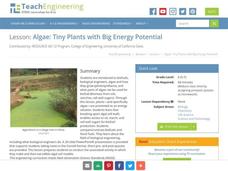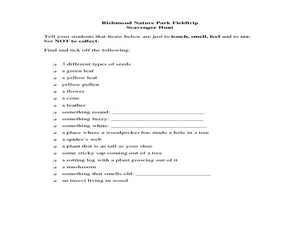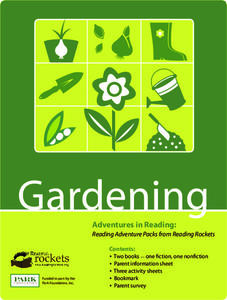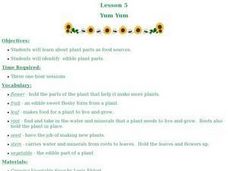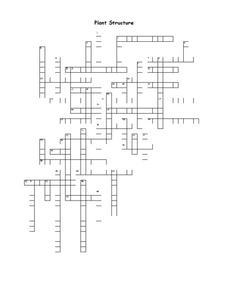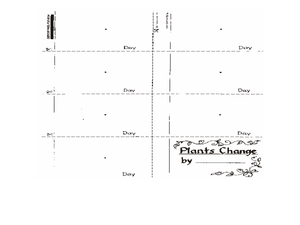Curated OER
3-D Cell Model
Life science laureates choose a plant or animal cell to construct a model of as an at-home project. This handout provides guidelines, suggested materials, and a grading rubric for their reference. A full-page letter to parents is also...
Teach Engineering
Algae: Tiny Plants with Big Energy Potential
My, what big energy potential you have! Scholars learn about the energy potential of using algae as a biofuel. A PowerPoint presentation first describes the structure of algae and then how researchers use algae as biofuel to produce energy.
Curated OER
Botany Basics
Students survey plants. In this plant identification instructional activity, students explore the difference in plants to aid identification. Students determine which plants may be used for medicinal reasons.
Curated OER
Richmond Nature Park Field Trip
Students identify different plants and their uses by attending a field trip. For this Canadian plant lesson, students explore the great outdoors of Vancouver, B.C. and discuss the uses of plants by the Native Americans that once resided...
Curated OER
The Seed Match
Students examine seeds and predict the plant it comes from. In this seed match lesson, students match seeds to plants and then see if their predictions are correct. Students predict the number of seeds found in plants as well. Students...
Curated OER
Plants
First graders learn the basic needs of plants, label the major parts of a plant and name their uses. They also use a KWL chart.
Curated OER
Lets Think About...Plants
Students bring in various vegetables and make friendship soup. They plant seeds and discuss the things plants need to grow and thrive.
Curated OER
Parts of a Plant
Children explore the parts of a plant (flower, seeds, stem, leaves, and roots) using a dandelion as an example.
Curated OER
Sun Seeking Plants
Pupils investigate the story "The Tiny Seed" by Eric Carle. This story is used to introduce the children to the concept that seeds change and grow into plants when conditions in the environment including temperature, light, water and...
PBS
Reading Adventure Pack: Gardening
A Reading Adventure Pack invites scholars to start gardening. Following a reading of two books—fiction and nonfiction—young green thumbs repurpose food containers to grow an herb garden in their kitchen, plant seeds in starter pots out...
Curated OER
Yum Yum: Making Vegetable Soup
Students investigate agriculture by reading a book. In this plant life lesson, students read the book Growing Vegetable Soup by Louis Ehlert, and examine the ingredients used in the book's soup. Students create an experimental,...
Curated OER
Growing Pains
Students compare common food items with the parts of a plant. They grow their own plants to assess the difficulties in assisting a plant's growth and reproduction.
Curated OER
The Seed Match
Young scholars study seeds and plants. In this science lesson, students explore seeds from various types of plants and complete a worksheet about seeds. Young scholars discuss plants that are fruits and vegetables and where they grow.
Curated OER
From McGee's Farm to the Movies
Young scholars participate in several plant-themed activities. They keep a food log, identify any plants they have eaten and then classify these foods by the part of the plant that is edible. Students sing songs about plants, make...
Curated OER
Writing an Explanation
Bananas are an important part of a healthy diet - but where do they come from? Third graders write an explanatory text about the origins of bananas. The bottom part of the paper includes necessary information about bananas, as well as a...
Curated OER
The Living Environment
In this living environment worksheet, students complete a crossword puzzle given 34 clues about the various species in the environment that produce, consume and decompose. Topics also include photosynthesis, respiration, glucose, organic...
Curated OER
Plant Structure
In this plant science worksheet, students complete a crossword puzzle with 48 questions. They identify the different parts of a plant.
Curated OER
Plant Seedling
Students label seed parts and plant seeds. In this seeds lesson plan, students observe and learn about how seeds play a huge role in all plants and food.
Curated OER
From Flower to Fruit
Students examine how flowers have essentially four parts. They learn both the male and female reproductive parts of the flower, then explore self-pollination and pollination by insects and other animals.
Curated OER
Make an Edible Coral Reef
Students create an edible coral reef out of food and candy. In this Science lesson plan, students explore what a coral reef is and the coral reef's importance to the ecosystem. Additionally, students discover the different parts of a...
Curated OER
Botany
In this botany worksheet, students read a 2 page article on botany, choose the multiple choice answer to 3 questions, determine if 3 statements are true of false and fill in the blanks in 5 facts about botany.
Curated OER
How Does A Seed Become A Plant?
First graders evaluate what it takes for a seed to become a plant. They brainstorm what they know, discuss what they want to know and interact with a Plant WebQuest that indicates what they have learned. They also examine how we get the...
Curated OER
Rosa Parks Community Garden
Ninth graders investigate how we depend on plants as the original source of most food. They investigate the parts of plants, and which parts are edible. Students are explained that the garden is also a classroom and the same rules apply.
Curated OER
Fruit or Vegetable?
Watermelon is a vegetable? A tomato is a fruit? Believe it or not, this debate is decades old. Groups examine rulings by the US Supreme Court, the USDA, and state statutes before developing their own criteria to use when labeling the...



